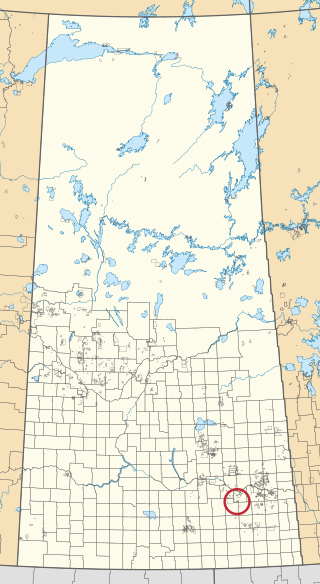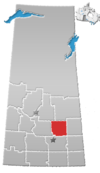
The Fishing Lakes, also called the Calling Lakes or the Qu'Appelle Lakes, are a chain of four lakes in the Qu'Appelle Valley cottage country about 40 miles (64 km) to the north-east of Regina in the Canadian province of Saskatchewan. The lakes are in a region called the Prairie Pothole Region of North America, which extends throughout three Canadian provinces and five U.S. states. It is also within Palliser's Triangle and the Great Plains ecoregion. The Fishing Lakes all follow the course of the Qu'Appelle River, which flows from the west to the east and is part of the Hudson Bay drainage basin. The lakes sit in the deep-cut Qu'Appelle Valley that was formed about 14,000 years ago during the last ice age. Meltwater from the glaciers carved out the valley and as water levels rose and fell, alluvium was left in the wake. These piles of alluvium are what created the separations between the lakes.
Fishing Lake is a closed basin freshwater lake in the Canadian province of Saskatchewan. The lake is 22 kilometres (14 mi) north of the town of Foam Lake, and 24 kilometres (15 mi) east of the town of Wadena and is accessed from Highways 5 and 310. The northern and eastern shore is in the RM of Sasman No. 336 and the southern and western shore is in the RM of Foam Lake No. 276. The north-east portion of the lake–on the east side of McCormick Bay–is designated as Fishing Lake Wildlife Refuge.
North Shore Fishing Lake is a hamlet in the Rural Municipality of Sasman No. 336, Saskatchewan, Canada. Listed as a designated place by Statistics Canada, the hamlet had a population of 50 in the Canada 2016 Census. It is located on the north-eastern shore of Fishing Lake.

The Treaty Four Reserve Grounds 77 are an Indian reserve in Saskatchewan, Canada, shared by 33 band governments from Saskatchewan and Manitoba. The Reserve Grounds are located adjacent to and west of Fort Qu'Appelle. In the 2016 Canadian Census, they recorded a population of 15 living in 6 of their 8 total private dwellings.

Star Blanket 83C is an Indian reserve of the Star Blanket Cree Nation in Saskatchewan. It is 18 kilometres northeast of Lipton. In the 2016 Canadian Census, it recorded a population of 0 living in 1 of its 1 total private dwellings.

Carry the Kettle 76-1 is an Indian reserve of the Carry the Kettle Nakoda First Nation in Saskatchewan. It is 21 kilometres north-east of Sintaluta.

Fishing Lake 89 is an Indian reserve of the Fishing Lake First Nation in Saskatchewan. It is 119 kilometres (74 mi) north of Fort Qu'Appelle. In the 2016 Canadian Census, it recorded a population of 406 living in 128 of its 161 total private dwellings. In the same year, its Community Well-Being index was calculated at 54 of 100, compared to 58.4 for the average First Nations community and 77.5 for the average non-Indigenous community.

Fishing Lake 89A is an Indian reserve of the Fishing Lake First Nation in Saskatchewan, Canada. It is Section 13 and the south-east portion of Section 14, Township 33, Range 12, west of the Second Meridian. In the 2016 Canadian Census, it recorded a population of 0 living in 0 of its 0 total private dwellings.

Sabitawasis Beach 89 C-1 is an Indian reserve of the Fishing Lake First Nation in Saskatchewan.

Muscowpetung 80 is an Indian reserve of the Muscowpetung First Nation in Saskatchewan. It is 31 kilometres west of Fort Qu'Appelle along the south-west shore of Pasqua Lake, which is one of four Fishing Lakes. In the 2016 Canadian Census, it recorded a population of 275 living in 87 of its 112 total private dwellings. In the same year, its Community Well-Being index was calculated at 54 of 100, compared to 58.4 for the average First Nations community and 77.5 for the average non-Indigenous community.

Muskowekwan 85-1 is an Indian reserve of the Muskowekwan First Nation in Saskatchewan. It is 6 kilometres north of Leross. In the 2016 Canadian Census, it recorded a population of 0 living in 0 of its 0 total private dwellings.

Muskowekwan 85-8 is an Indian reserve of the Muskowekwan First Nation in Saskatchewan. It is 6 kilometres northeast of Lestock. In the 2016 Canadian Census, it recorded a population of 5 living in 1 of its 2 total private dwellings.

Muskowekwan 85-10 is an Indian reserve of the Muskowekwan First Nation in Saskatchewan, Canada. It is 6 kilometres north of Lestock. In the 2016 Canadian Census, it recorded a population of 5 living in 1 of its 2 total private dwellings.

Muskowekwan 85-12 is an Indian reserve of the Muskowekwan First Nation in Saskatchewan. It is 12 kilometres west of Kelliher. In the 2016 Canadian Census, it recorded a population of 0 living in 0 of its 0 total private dwellings.

Muskowekwan 85-15 is an Indian reserve of the Muskowekwan First Nation in Saskatchewan. It is 6 kilometres north of Lestock. In the 2016 Canadian Census, it recorded a population of 5 living in 1 of its 1 total private dwellings.

Muskowekwan 85-26 is an Indian reserve of the Muskowekwan First Nation in Saskatchewan. It is 64 kilometres northwest of Fort Qu'Appelle. In the 2016 Canadian Census, it recorded a population of 0 living in 0 of its 0 total private dwellings.

Muskowekwan 85-28 is an Indian reserve of the Muskowekwan First Nation in Saskatchewan. It is 105 kilometres west of Yorkton. In the 2016 Canadian Census, it recorded a population of 0 living in 1 of its 1 total private dwellings.

Muskowekwan 85-29 is an Indian reserve of the Muskowekwan First Nation in Saskatchewan. It is 107 kilometres west of Yorkton. In the 2016 Canadian Census, it recorded a population of 5 living in 2 of its 3 total private dwellings.

Standing Buffalo 78 is an Indian reserve of the Standing Buffalo Dakota Nation in Saskatchewan. It is 8 kilometres north-west of Fort Qu'Appelle. In the 2016 Canadian Census, it recorded a population of 569 living in 184 of its 198 total private dwellings. In the same year, its Community Well-Being index was calculated at 59 of 100, compared to 58.4 for the average First Nations community and 77.5 for the average non-Indigenous community.

Wa-pii-moos-toosis 83A is an Indian reserve of the Star Blanket Cree Nation in Saskatchewan. In 2016, its Community Well-Being index was calculated at 61 of 100, compared to 58.4 for the average First Nations community and 77.5 for the average non-Indigenous community. The name of the locality means "White Calf".


















